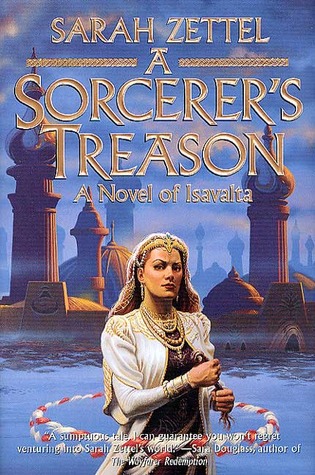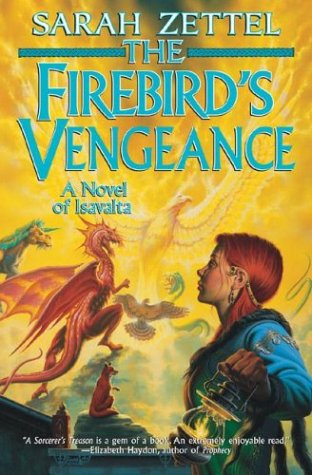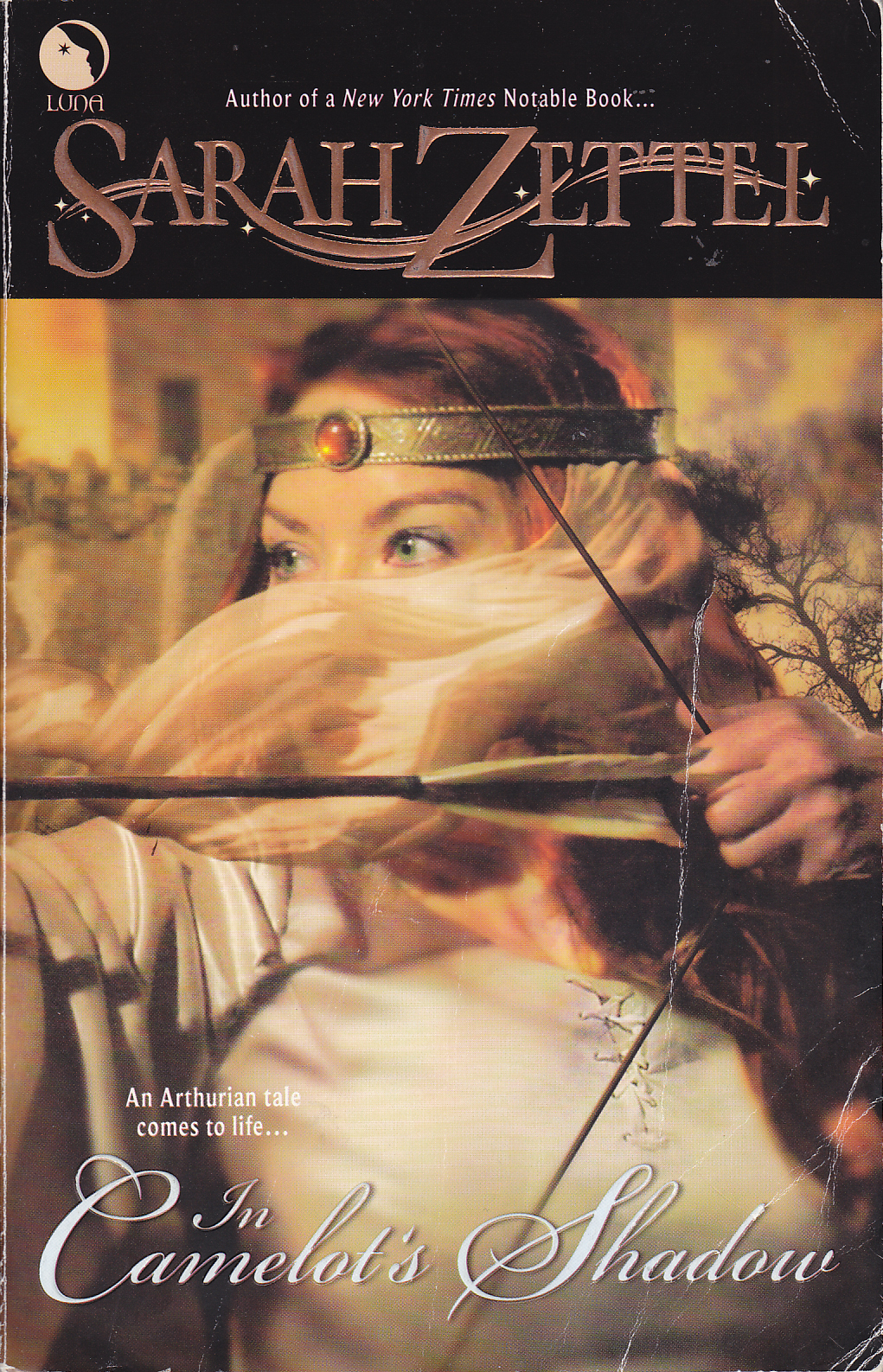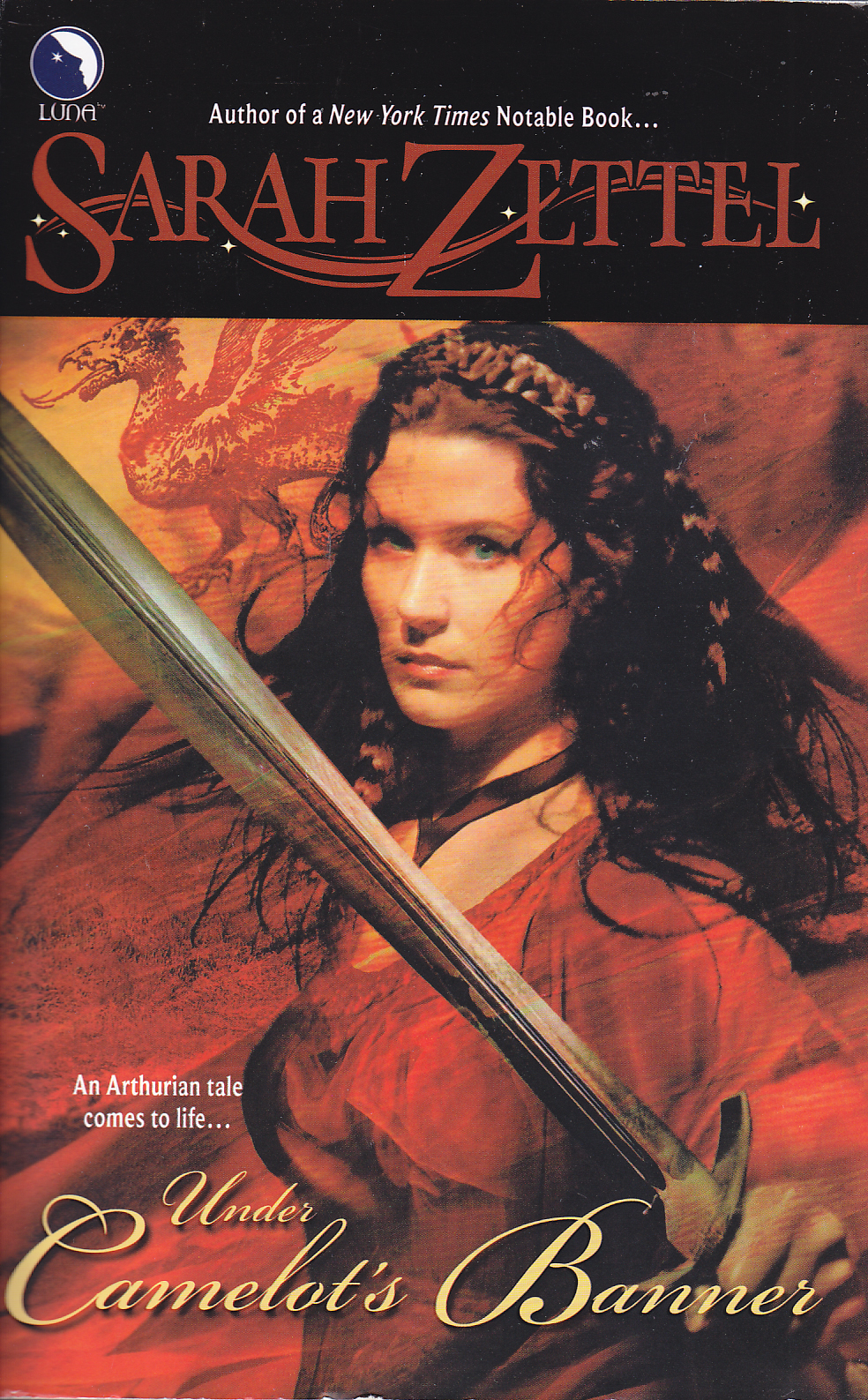Sarah Zettel
Books: Fantasy
Paths to Camelot: In Camelot's Shadow (2004), For Camelot's Honor (2005), Under Camelot's Banner (2006), By Camelot's Blood (2008)
Isavalta: A Sorcerer's Treason (2002), The Firebird's Vengeance (2004)
Isavalta
A Sorcerer's Treason (2002)
 Bridget Lederle has inherited her father's job as a lighthouse keeper on Sand Island, a job that is perfect for her, not only because she is shunned by much of the community, but also because she has a sight that often shows her when danger lurks. When she rescues a sailor from the rocky shores, he knows of her sight and wants her to return with him, where her power is needed.
Bridget Lederle has inherited her father's job as a lighthouse keeper on Sand Island, a job that is perfect for her, not only because she is shunned by much of the community, but also because she has a sight that often shows her when danger lurks. When she rescues a sailor from the rocky shores, he knows of her sight and wants her to return with him, where her power is needed.
I really liked this book. I'm often wary of books that take someone from our reality and place them in a different reality, but I liked the way Sarah Zettel worked things. Part of it may have been because the book was set in 1899, so both settings were somewhat foreign.
Bridget is a wonderful heroine; she is strong and stands up for herself and those around her. More importantly Sarah Zettel's villains are also excellent--their motivations are understandable, and I felt sympathy for them, and understood how they could have ended up on the path they took.
I love complicated villains.
The magic use in this book fascinated me. Magic is created by creating intricate knots, be it with string, hair, rags, wire--anything that can be tied or braided. It was unique, simple, and reasonable.
Even the cover is good. It showed the heroine, with braids and knots to represent the magic use, but didn't depict any particular scene, so it gave you an idea about the book, without giving things away.
There are, as of now, three Isavalta novels, however they are not written as a series where a continuing story runs through three books, but instead are complete novels in and of themselves. I really with that more authors would write like this. Often I have time to read one book, but not an entire trilogy or series, and so books like this are perfect.
You can read A Sorcerer's Treason without having to immediately read The Firebird's Vengeance to find out what happens with the story line, although you'll probably want to, because you'll want to read more about Bridget. That reason alone makes this a good book, however the writing and the story and the characters are also good, which makes this an excellent book.
Publisher: Tor
August 2005 | Rating: 9/10
The Firebird's Vengeance (2004)
 The Firebird's Vengeance is Sarah Zettel's third book Isavalta book, set soon after the events of A Sorcerer's Treason. Bridget Lederle is contacted by the Vixen, who warns Bridget that the Firebird is coming to take revenge upon Isavalta and Hung-Tse. She also poses an enigmatic question about Bridget's family, that leads Bridget to wonder whether her daughter is, in fact dead, or whether she was instead stolen as an infant. All the while Bridget is learning to master her magical skills.
The Firebird's Vengeance is Sarah Zettel's third book Isavalta book, set soon after the events of A Sorcerer's Treason. Bridget Lederle is contacted by the Vixen, who warns Bridget that the Firebird is coming to take revenge upon Isavalta and Hung-Tse. She also poses an enigmatic question about Bridget's family, that leads Bridget to wonder whether her daughter is, in fact dead, or whether she was instead stolen as an infant. All the while Bridget is learning to master her magical skills.
Although things were resolved in A Sorcerer's Treason, there were still some questions left unanswered, and this book addresses some of those questions: What happened to Kalami's daughter after Kalami failed in his mission for Hung Tse? Does Bridget become trained in her magics? What happens to Sakra? Does the Firebird make it back between the Shifting Lands?
This book focuses upon Bridget and Sakra, and Kalami's daughter Tsan Nu and her guardian Mae Shan. Although Ananda and Mikkel make brief appearances, they are only peripheral to the plot. It is interesting, though, to see Mikkel facing the hard decisions of ruling, and comparing his decisions to those made by his mother.
Like A Sorcerer's Treason, this book is a good book, and I was glad to read more about Bridget and Sakra. The only weakness, in my opinion, is that Kalami was far more on dimensional in this book. That may be due to the fact that he was dead, however I found him more interesting in A Sorcerer's Treason. That doesn't mean, however, that he isn't dangerous here.
I also liked the return to Aunt Grace, who played only a small part in the A Sorcerer's Treason. She is an interesting character, with her past hovering over everything she does, and I like the fact that she does care about Bridget, despite the pressure of those around her, to write Bridget off.
Again, a strong story, and strong characters. I wouldn't recommend reading this book before A Sorcerer's Treason, because although Sarah Zettel does explain the background of the characters, it's good to know Sarah's background and her story.
Publisher: Tor
August 2005 | Rating: 8/10
In Camelot's Shadow (2004)
 I knew when I started the book that this was going to be a fantasy/romance. Perhaps for that reason, or perhaps because the romance was well done, and I haven't read a well written romance before. But whatever the reason, I really liked this book.
I knew when I started the book that this was going to be a fantasy/romance. Perhaps for that reason, or perhaps because the romance was well done, and I haven't read a well written romance before. But whatever the reason, I really liked this book.
I picked it up because I had read a positive review, and then came across a used copy, and so decided to take a chance. And because it has a gorgeous cover. Yay for strong beautiful women, and yay for cover at that gets things precisely right. The character and costume are exactly as described in the book, but the cover doesn't give away any of the story.
As far as historical accuracy, oddly enough my knowledge of legend and folklore has a huge hole in it the size of Camelot--I may own La Mort d'Arthur, but I haven't yet gotten around to reading it. So everything I know of Camelot comes from The Mists of Avalon. However since I don't know the story, I wasn't bothered by the fact that the story wasn't accurate, so that's probably a good thing.
The story is of Risa's flight from her father's deal with a sorcerer, and Sir Gawain attempt to save her from her plight. However, I was quite pleased with the fact that Risa wasn't waiting around to be rescued, but was instead going about attempting to rescue herself. Again, this may well be historically inaccurate, but I have no interest in reading about women waiting around to be saved, so this was perfect.
The book seems a combination of modern and historical--Risa is a strong woman, probably stronger than one might have found at that time, but not unreasonably so, given that she was an only child, doted on by her parents. But even if it is unreasonable given the context (and I don't know if it is or not) it doesn't bother me, because I'm used to fantasy placed in a setting where women can be strong without causing comment. She was, however, concerned with propriety; knowing that traveling alone with a man, even a knight, it would be assume that her virtue had been compromised. But she wasn't that concerned. Again, no clue if it's historically accurate, but it was interesting.
When her mother was pregnant, Risa's father made a deal with a magician to save his wife–when asked, he would give up his daughter is the magician would save the life of his beloved wife. Risa grows into a beautiful young woman who doesn't understand why her father will not allow her to marry, for he never told her mother or her about the deal he made.
Also, there is Sir Gawain of Camelot, who wants to save Risa from the evil magician, but it is truly Risa's story. And that's what I loved so much–that in the time period and setting, we had a believable heroine who was able to defend and fight for herself, yet still a woman of her world and time.
(T)he Saxon's cursing and the clash of metal and splintering wood masked the soft sound of her pulling and arrow from her quiver, and nocking it into her string.
It is just like a deer. It is just like a quail. Breathe slowly. It is a deer. It is not a man. I am not about to kill a man.
Risa drew the string back to her ear. She sighted along the shaft.
Risa is marvelous.
So I liked this book, and enjoyed it although it was a departure from my normal fare. The romance bits were not too overwhelming, and were tame enough that I will have no problem loaning this book to my grandmother.
NOTE: As a note, my grandmother also loved this book and this series, and we both waited impatiently for the publication of the fourth and final book in the series after Luna (for some insane reason) dropped this series.
Published by Luna
- August 2005 | Rating: 9/10
- Feb 2014 | Rating: 8.5/10
For Camelot's Honor (2005)
 In a burst of paranoia, I held of reading this book, for fear that it wouldn't be as good as the previous in this series, In Camelot's Shadow. Once again I was proven to be just that–paranoid. I was pleased to discover that Sarah Zettel did a good job with this follow up, and the second book in what she says is to be a four book series.
In a burst of paranoia, I held of reading this book, for fear that it wouldn't be as good as the previous in this series, In Camelot's Shadow. Once again I was proven to be just that–paranoid. I was pleased to discover that Sarah Zettel did a good job with this follow up, and the second book in what she says is to be a four book series.
Again, like In Camelot's Shadow, the lovely thing about this book is that it stands by itself. Although characters from the previous book are mentioned, you don't have to know what happened before to enjoy this book. Additionally, the story is complete by itself. (Although the epilogue in this book lets you know that Morgaine is still in play, she's not doing anything, and so I could be content if I didn't get to read another book in this series. Except, of course, for the fact that I'd probably be missing out on some good storytelling.
And once again, a gorgeous cover. It does not depict a scene from the book, but instead shows the major elements of the story: Elen, the hawk, and the spear. And it's just a lovely looking cover. Of course it's probably not a cover that Michael will want to be seen reading in public, but that's a small price to pay.
Elen is the daughter of a Welsh chieftain, and King Arthur wants her family to join with him. She also, like her mother, serves as midwife to her people, and sometimes to those who life Under the hill. Unfortunately, there are those who do not want Elen's family to come to an agreement with the King Arthur. When Elen discovers herself in danger, she calls to Merlin for help, and one of those Arthur sends is Sir Geraint, his nephew, and the brother of Gawain (of the previous book)
There was a very interesting passage between Merlin and Geraint.
"I keep silent because words have power, Geraint. Because in the act of speaking, I change the balance. What is seen changes because it has been seen, and if I speak of the change, it changes again. I see only what might be, and what might be, might also be changed, even by so small a thing as a word." His smile was small. "There. Now you know the weakness of Merlin."
I find that passage interesting, because although Merlin is speaking of his ability to see the future, it's good for me to remember that words do have power, and words can cause change.
Sometimes it's easy to forget that.
Like the previous book, For Camelot's Honor is a romance, however it's also very good fantasy--fantasy with strong female characters.
One odd thing about this book, however, was that I had forgotten that Morgaine is, in most Arthurian stories, rather evil. As I loved Marion Zimmer Bradley's The Mists of Avalon, it's always disconcerting to see Morgaine as evil. However, I got over it.
As with other books, Sarah Zettel's writing is again excellent, as is her storytelling, as are her characters. It was enjoyable, and assuming that my grandmother enjoys In Camelot's Shadow, I will loan her this as well, because I think that she'll like it.
Published by Luna
- December 2005 | Rating: 8/10
- March 2014 | Rating: 6/10
Under Camelot's Banner (2006)
 Under Camelot's Banner is the third book in Sarah Zettel's Camelot series. There isn't a specific name for this series, but all the books have Camelot in the title, so that's obvious enough.
Under Camelot's Banner is the third book in Sarah Zettel's Camelot series. There isn't a specific name for this series, but all the books have Camelot in the title, so that's obvious enough.
Books published by Luna typically have a romantic or erotic element, however, they also tend to have female leads, which is how I ended up overcoming my aversion to romance to check out a Luna offering. There is romance in Under Camelot's Banner, but to me (someone who doesn't read romance) it seems very understated, and second to the other elements of the story. In fact, I've read mainstream fantasies by male authors that had just as much (if not more) of a romantic theme.
Lynet is from the kingdom of Camilard, the kingdom next to Tintagel, and although they are loyal, many are feeling abandoned by Camelot, and if their neighbors--instigated by Morgaine--rebel, Camilard will be caught in the middle. Additionally, Lynet was a maid to Queen Iseult, and a messenger between Tristan and Iseult, before their adultery was discovered. After Tristan's murder and Iseult's death, Lynet was blamed and sent home in shame.
As much as I like Sarah Zettel's writing, I think that this is the weakest of the three books. However, Lynet is such an appealing and interesting character that I really didn't notice while I was reading. Lynet sees herself as damaged goods. However, despite the fact that she doesn't have a great deal of self-esteem, her family is important to her, and so when the need arises, she is willing to stand up and do what must be done, and refuses to let anyone stand in her way.
This worked very well for me. Through the book Lynet has to discover her own strengths and worth, yet has a task of importance to complete, that requires her to stand up for herself and her home.
Lynet Carnbrea is the daughter of Steward Kenan, the man who holds Camilard for Queen Guinevere, whose name is under a shadow, for she acted as a go-between for Tristan and Iseult. Shamed, and broken by her penance, she is seen as damaged goods, and so unlike her sister, cannot even be used in a political alliance.
Gareth is Sir Lancelot's senior squire, and a man who has mistakenly take his cues on women from Lancelot. Gareth is out of graces with his brothers, and quite soon to be with even his knight.
Interestingly, unlike the first two books, these two don't get together until the end of the book, for Lynet–justifiably–sees Gareth as someone to avoid. And she fears her reputation has ruined her. But despite this, she wants more than anything to save her home, so she travels to Camelot to fetch their Lady, Queen Guinevere.
There is a lot of politics in this story–the reasons why Guinevere didn't return to Camilard, Morgains machinations to take down Arthur, Lancelot's place in the court–but it's all very interesting, especially as we get a different take on Tristan and Iseult, as well as the relationship between Guinevere and Lancelot (Lancelot is an asshole, so it's interesting to see how things are spun between them.)
"There goes one who knows his own worth a little too well."
One of the problems I had with the story was with Colan. She tried to make him somewhat sympathetic, but it just doesn't happen for me, no matter how regretful he may be.
Time and again, he saw his hands reach for the dagger, felt the give of cloth and doft flesh, saw the startled look… Time and again, he wanted to cry out to his remembered-self to stop, to think, to drop the blade, and yet that other self never did. He never could. Colan had come to welcome the thirst and hunger that racked him…
Colan repeatedly regrets his actions, and then turns around and once again betrays.
I just have a hard time accepting that Morgaine could have such a hold one men that they would behave as they do. I get that she finds a weakness, and worms her way in from there, but the action is still taken by the men (and women) themselves.
Unlike the previous two books, the male character, Gareth, is a cad, and not particularly likable, so I had a hard time, initially, seeing him as a romantic interest for Lynet, whom I liked very much. It just didn't seem right that she be stuck with this jerk. Especially when he is compared unfavorably to his brothers (See romantic interests in the previous two books.) Yet it worked out (I did mention this is a romance) and I felt that Gareth managed to redeem himself sufficiently.
As was started in the last book, For Camelot's Honor, Morgaine is behind many of the problems in Camelot, and throughout the kingdom, and although appears only a few times, is the third major character, as she is in the middle of everything.
One thing that I especially liked about this book, as the relationship between Guenevere and Lancelot. I was very surprised at their relationship, and am even more curious as to what will happen with them in the last book. (I believe there are going to be four books.)
And again, the cover of this book is gorgeous. The way her hair is flying around, the dress, the sword. I think the whole thing is beautiful. It's nice to have covers that you don't feel ashamed to be carrying around. It's the kind of cover that I look at, and immediately want to know more about the book.
Overall, there wasn't anything bad about this book, it simply wasn't as good as the previous two books. There isn't anything specific, I just didn't absolutely love, love, love it, like I did with the first book. Which is okay, because you can't win 'em all. And it's still a good book; very solid and well-written, with a wonderful heroine. It just lacked that certain something that I've come to expect from Sarah Zettel. However, I still recommend it without reservation, and like the previous two books, it stands alone, and can be read without having read the other two books.
Published by Luna
- April 2006 | Rating: 7/10
- March 2014 | Rating: 7/10
Camelot's Blood (2008)
 I've been waiting for this book since before Luna lost it's collective mind and dropped Sarah Zettel and this series. (And if anyone from Luna reads this, it's made me more reluctant to buy books in the Luna line, wondering if another series I like will be summarily dropped.) But finally Camelot's Blood was published–in Britain.
I've been waiting for this book since before Luna lost it's collective mind and dropped Sarah Zettel and this series. (And if anyone from Luna reads this, it's made me more reluctant to buy books in the Luna line, wondering if another series I like will be summarily dropped.) But finally Camelot's Blood was published–in Britain.
So I put it on my wishlist kept hoping it'd be published in the US soon. But I got lucky while waiting, because my brother found this book and ordered it for my birthday, which is fantastically awesome. Of course as soon as I opened the package, I had to fend off my grandmother, who also wants to read the book, and was beginning to wonder if it was ever going to be published.
The fourth and last book in the series follows Laurel Carnbrea who has made an alliance with Camelot. She will cede her kingdom to her sister Lynet and her husband Gareth, and in turn marry Agravain, the last single son of Lot and Morgause. Because this alliance will protect Cambryn and her people, she enters into blind, knowing nothing of the man she is to marry.
Unlike the previous books in the series, the marriage in Camelot's Blood takes place at the start of the series, and what we witness is a couple who has married for politics coming to know and love each other. Of course since this is a fantasy, the story is much more complex than that. Morgaine and Mordred continue to threaten Arthur, and with Lot's continued decline, are moving on Gododdin in an attempt to enact revenge on the husband of Morgaine's twin sister.
As with the other books, we see Camelot from the periphery. Laural is there briefly before leaving for Gododdin with Agravain, but despite the brief time spent there, Arthur and his knights fill the entire book, for it is his kingdom Morgaine and Mordred threaten.
Also as with the previous books, the story sucked me in quick quickly, and I had a very hard time putting the book down to do things like eat and sleep. Although I wasn't sure how I truly felt about Laurel's battles with Morgaine, I was so eager to find out what happened it didn't seem to matter one way or another.
And although this cover was very different from the previous three, I think it was still gorgeous and perfect for the book (despite the fact the chopped the top of Laurel's head off.) All the important elements are there, the woman is beautiful and looks like Laurel is described, and the background is absolutely lovely. Despite shifting publishers, Sarah Zettel has been incredibly lucky to have ad gorgeous covers for all four books in this series.
Was this book as good as the previous three? It isn't my favorite. However, there were threads that had to be tied up, so there was a great deal to do in this book, so we didn't get to spend quite as much time seeing Laurel grow into herself and accept her life–things were a bit rushed. But despite that, it was a strong and fitting ending to the series, and one I thoroughly enjoyed.
- July 2008 | Rating: 7/10
